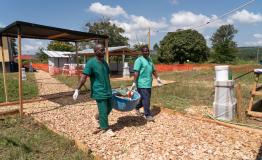

Ebola and Marburg
Ebola virus and Marburg haemorrhagic fevers are rare but deadly, spreading fear and panic. Caring for infected patients and affected communities is crucial for a response to be effective.
Outbreaks can kill 25 to 90 per cent of those infected. No cure exists and treatment is currently mainly symptomatic. MSF has intervened in almost all reported outbreaks over the past years.
The 2014-2015 Ebola virus epidemic in West Africa was unprecedented: 67 times the size of the largest previously recorded outbreak, it reached urban areas, and killed more than 11,300 people. Hundreds of health workers died, decimating the already-struggling healthcare systems of Liberia, Guinea and Sierra Leone.
About Ebola And Marburg
Once a case of Marburg or Ebola virus is confirmed, a swift response is vital. The needs of patients and affected communities must remain at the heart of the response, which can be defined by six main pillars : care and isolation of patients; tracing and follow up of patient contacts; raising community awareness of the disease such as how to prevent it and where to seek care; conducting safe burials; proactively detecting new cases; and supporting existing health structures.
Diagnosing Ebola virus or Marburg haemorrhagic fevers is difficult because early symptoms, such as fever and sore throat, are common to many illnesses. A patient presenting early symptoms should be cared for and isolated to prevent further risk of infection to relatives and caretakers. Public health professionals should be notified and a laboratory test must be carried out to confirm a diagnosis. Such tests are an extreme biohazard risk and should be conducted under maximum biological containment conditions.
There is no specific treatment for Ebola or Marburg haemorrhagic fevers. Standard care is limited to supportive therapy, such as hydrating the patient, nutritional support, providing fever and pain medication, and drugs to reduce vomiting and diarrhoea. Other diseases the patient may have such as malaria or sepsis, should also be treated. Patients should be isolated to prevent infecting others. Psychological support should be provided to help patients and families.
Human to human transmission occurs through contact with bodily fluids of an infected person or through surfaces contaminated with these fluids. Infection control in health centres is vital to reduce risks for other patients, for caregivers and health workers. Those caring for infected patients must wear personal protective equipment (PPE). Direct contact with the deceased can transmit the virus, so burial teams also use PPE, and safe burials must be carried out in a dignified manner for family members.
In the wake of the 2014-2015 West Africa Ebola virusepidemic, an investigational vaccine was developed that can help control an outbreak. The vaccine is currently being trialled in an Ebola virusoutbreak in the DRC, as part of the overall strategy to control the epidemic. MSF vaccinated Ebola virus frontline workers and patient contacts in remote communities in the Équateur province, Bikoro. Participation is voluntary and the vaccine is free.
Survivors often face stigma and are ostracised from their communities. This, and the trauma of having lived through such a deadly disease, often requires counselling. People may experience ongoing physical side-effects, such as joint pain, headaches and eye problems that require treatment and follow up. MSF established Ebola virus survivor centres in three worst-affected countries after the West Africa epidemic.
